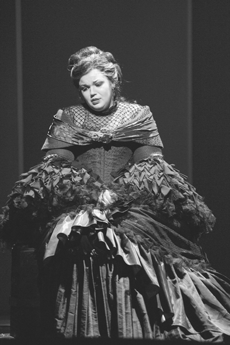Festival excels with Hartke premiere and Janácek’s “Jenufa”
This summer Glimmerglass premiered Stephen Hartke’s new “The Greater Good” to Philip Littell’s skillful libretto based on Guy de Maupassant’s “Boule de Suif.” In the story, a group of passengers trying to flee the Franco-Prussian War occupation compel a prostitute in their midst to sleep with a Prussian officer delaying them; then they treat her like dirt. One would have thought the tale too static and narrator-based for the stage, but it worked, though not all the political and social subtleties get across. At least in Glimmerglass’ wonderfully evocative and disciplined production by David Schweizer, the opera made a highly effective piece of music theatre. The music itself, deftly and inventively scored, contains some passages of considerable interest—the writing for vocal ensembles particularly graceful—and some which seemed like standard issue post-Shostakovitch/Britten procedure. Mark Wendland’s wonderfully elastic unit set and David Zinn’s terrifically imaginative black and white period costumes handsomely complemented the production.
Nothing proved unpleasant to listen to—except the loud, ill-tuned bleating of John David deHaan, whose performance as Loiseau was also dramatically awkward. Though the second act could probably stand shortening the music served Litell’s text well. Unlike in many contemporary American operas, an intelligent attempt had been made to style individual vocal idioms for the varied characters. The opera treats themes of proper treatment of prisoners and the uneven shouldering of the burdens of war along class and gender terms—all too pertinent today.
The splendid figure of Carolyn Worra was augmented by padding for “Boule de Suif,” and her thousand-watt smile and compelling personality made her erotic pull credible. Vocally she was excellent, cleanly articulating the wide -ranging part; Worra’s rising career should go truly international any day now. Bass Andrew Wentzel made an imposing, credible Comte de Bréville, singing splendidly with excellent diction and expression. The three upper class women—Elaine Alvarez (La Comtesse de Bréville), Christine Abraham (Mme. Carre-Lamadon), and Jill Gardner (Mme. Loiseau), given an arioso apiece and much ensemble singing, acquitted themselves with distinction. The always stageworthy Dorothy Byrne made a star turn out of Mme. Folleville’s denunciation of warmongers, and gave a lesson in character presentation to the company’s young artists. Besides Alvarez and Gardner, noteworthy among these was Matthew Worth as the Cocher—an arresting presence and baritone. But the most spectacular performance was that of coloratura Jeanine Thames, who after over an hour of unsmilingly near-silence burst passionately into a long, difficult aria hymning sacrifice, with fiorature suggesting the Queen of the Night singing Henze.
Stewart Robertson, retiring as Music Director at the season’s end, led a strong reading of “The Greatest Good” and an even stronger one of “Jenufa,” a company premiere; the orchestra really surpassed itself. Since this production goes on to New York City Opera, Leos Janácek’s opera, wonderful as it is, had seemed a curious programming decision, given that the Met has a viable production featuring Karita Mattila in its repertory this year. Yet the staging by Jonathan Miller is sufficiently different—and successful—to merit the effort. Important as word setting is in this piece, one does question the truly foolish decision to have an all-Anglophone cast perform to largely Anglophone crowds in approximate Czech; a translation would have been more dramatically immediate and could have avoided some of the compromises of fact and nuance made in the surtitles.
Miller set the piece in a Czech colony in the American Northern Plains states circa 1941; the draft Steva evaded was for World War II. This took away nothing from the piece’s universal significance, and perhaps added a register of concern for the current repressive wave in places like South Dakota about abortion and women’s control of their own bodies. As nearly always, Miller made some bafflingly “tasteful” choices, having Laca slash Jenufa’s cheek offstage and undermining with physical understatement the titanic passions the music of both subsequent act curtains clearly intend. But the overall power of the piece came through, due in large part to an excellent cast. Maria Kanyova makes a wonderfully sympathetic and vulnerable stage figure and her impassioned singing contained much beauty; though there is some reserve power in her lyric soprano, the few real dynamic climaxes had to be negotiated swiftly. As with her Cio-Cio-San, this is a part one hopes this talented soprano performs only in smaller houses. Elizabeth Byrne’s superbly acted Kostelnicka, securely sung with steady metallic tone that in places softened into something like a sheen, made up for her unfortunate 2000 Salome. As Laca and Steva, tenors Roger Honeywell and Scott Piper acted very well and showed appropriately incisive timbres; there is not much legato in Honeywell’s arsenal, but he can punch out the climaxes. (I confess that I was shocked that Piper was the only African-American artist to be seen at Glimmerglass this summer; this has become a recurring lapse that the new General Director. Michael MacLeod, must remedy.) The veteran Judith Christin voiced Grandmother Burya with honor. Bass-baritone Seth Keeton suggested a major talent-in-the-making in both operas, with skilled, sonorous characterizations of Hartke’s cynical but principled revolutionary and Janácek’s pompous Mayor. These two outstanding productions continue through August 28 and 29 respectively.
David Shengold (shengold@yahoo.com) writes about opera for many venues.
gaycitynews.com



































